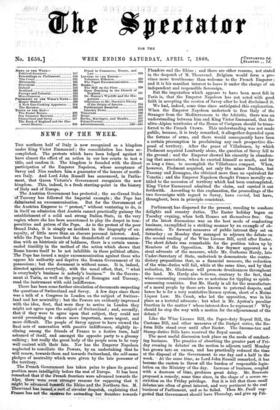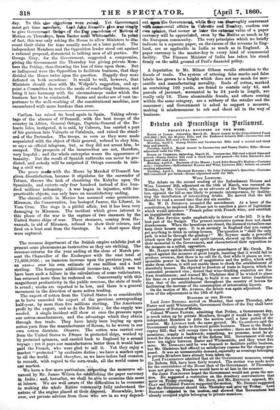Parliame4 has dispersed for the present, receding to seashore delights
and country duties. The Easter holiday began on Tuesday evening, when both Houses set themselves free. One of the latest discussions was on the best mode of conducting business, exemplified in a striking manner by an example of ob- struction. To forward measures of public interest they sat on Saturday ; on Monday they managed to adjourn the debate on the second reading of the Wine Licence Bill, until after Easter. The short debate was remarkable for the position taken up by Members of the Opposition. Mr. Ker Seymer appeared as a stout advoeate of the measure, while Mr. Gathorne Hardy, late Under-Secretary of State, undertook to demonstrate the contra- dictory propositions that, as a financial measure, the reduction of the wine-duties will fail, while at the same time, and by' that reduction, Mr. Gladstone will promote drunkenness throughout the land. Mr. Hardy also believes, contrary to the fact, that wine-consuming countries are as notorious for tippling as spirit- consuming countries. But Mr. Hardy is all for the manufacture of a moral people by those arts known to paternal despots, and hence he is for a very restrictive licence system, short of a Maine Liquor Law. Mr. Crook, who 'led the opposition, was in his place as a teetotal advocate ; but what is Mr. Ayrton's peculiar function in the matter ? whose interest does he represent ? 'Why should he stop the way with a motion for the adjournment of the debate ?
Like the Wine Licence Bill, the Paper-duty Repeal Bill, the Customs Bill, and other measures of the Budget series, the Re- form Bills stand over until after Easter. The Income-tax and Stamp-duties Bills have received the Royal assent.
The most useful discussion took Pace on the mode of oonduct- ing business. The practice of absorbing the greater part of Fri- day, in debates' on the motion to adjourn until Monday -has grown into an excess, and has practically reduced the time at the disposal of the Government to one day and a half in the week. At the same time as Lord John Russell remarked, it has h
become te custom to throw all the burden of responsible legis- lation on the Ministry of the day. Increase of business, coupled with a decrease of time, produces great delay. Mr. Bonverie proposed a remedy, some time since, in the shape of a severe re- striction on the Friday privilege. But it is felt that these small debates' areoften of great interest, and very pertinent to the real business of Parliament, and so he failed. Then Mr. Paull sug- gested that Government should have Thursday, and give up Fri- day. To this ejeo objectioiw were raised. Yet Government must get time eqpneltew, Lord Ji Hawn's plan wee ship* to give Governing:It Orders of the pey precedeuer of Notices of Motion on Thursdays, from Easter midl Whitsuotide. In past of fact, this was only asking the House to allow Ministers to dia. count their claim for time usually made at a later period. The independent Members and the Opposition leader stood out against a rational proposal, distasteful to talking men of all parties. Sir George Grey, for the Government, suggested a compromise, giving the Government the Thursday but giving private Mem- bers the Friday, thus throwing the loss of time upon them. But so indisposed were the Opposition to facilitate business, that they divided the House twice upon the question. Happily they were defeated on both occasions: It would be well, however, that Ministers should close with Mr. Walpole's suggestion, and ap- point a Committee to revise the mode of conducting business, and bring it into harmony with the circumstances under which the business has to be conducted. Forms and modes are of vast im- portance to the well-working of the constitutional machine, now encumbered with more burdens than ever.



























